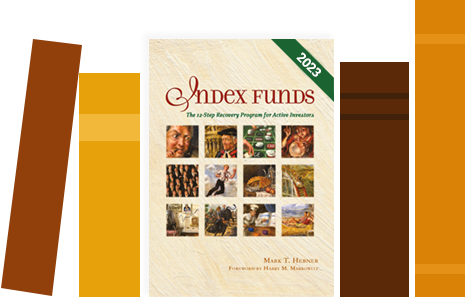Americans work hard to get ahead. When it comes to understanding what to do with their money, though, retirement experts warn that too many investors are under-educated about financial matters.
Mark Hebner, IFA's Founder and CEO, used to be one of those people. As a result, he doesn't take lightly the fact that April is designated by Congress as National Financial Literacy Month.
After starting a successful health care company right out of college, Hebner sold his stake at age 32. "Without giving it a second thought, I deposited that money with a big-name brokerage firm," Hebner recalled.
Not until a widowed friend asked for help in getting a handle on her finances did he come to realize how much investment management relied on speculation rather than an objective and evidenced-based analytical process to construct robust long-term portfolios.
As Hebner wrote in his seminal book, "Index Funds: The 12-Step Recovery Program for Active Investors," such research helped him to uncover "an ugly fact" about his own portfolio. His lack of understanding of how markets worked, he lamented, had cost him a substantial amount of money.

In building up a personal library that currently includes more than 2,500 financial books dating back to 1648, he reached an epiphany: "My time spent trying to beat the market had been wasted and was a very expensive lesson."
In 1999, Hebner set out to help other investors avoid making the same mistakes by creating an investment advisory firm that unlocked the "dark secret of active management" and focused on a fiduciary standard of care for its clients. His goal, he said at the time, was to "help investors replace speculation with an education."
These days, Hebner views Financial Literacy Month as an important reminder of a significant issue facing this country's investors and retirement savers.
A Lack of Education
Research on this problem doesn't paint a pretty picture. The Personal Financial Index, a joint project by the TIAA Institute and George Washingtion University, found in its 2022 study that "more U.S. adults have a very low level of financial literacy than in any year since 2017." In surveying 3,500 Americans, adults correctly answered just half of the questions on average about basic financial concepts. The P-FIN Index researchers noted this was a "troubling" figure that has "remained stagnant over time." It also reported:
- A greater number of adults (23%) than any year previously surveyed failed to correctly answer at least 25% of the questions.
- Comprehending risk remains the "area where functional knowledge tends to be the lowest," according to the Personal Financial Index's readings. Indeed, only about one-third of those questions were answered correctly. 1
One of the most comprehensive global studies was compiled by Standard & Poor's. Using data from researchers at George Washington University and the World Bank, some 150,000 adults from 148 countries were tested on basic financial conepts. It found the world's largest economy ranked just 14th when measuring proportions of adults that could be considered as financially literate.
The U.S. adult financial literacy rate was listed as lower than that of much smaller developed nations such as Denmark, the Netherlands and Sweden. Meanwhile, America's level of literacy also trailed those identified in Canada, Germany and the United Kingdom. 2
Much of that failure can be traced to a lack of public education. Only 23 states require high school students to take a personal finance-related course, according to the Council for Economic Education. Some 25 mandate at least one class in economics be taken.3
Talking About Money
Other researchers have found that parents don't spend much time, if any at all, on talking about money with their children. In a national survey of U.S. adults, just 13% reported their families talked about household finances while growing up.4
The Penny Hoarder poll also found that 40% of those surveyed didn't keep a household budget and 23% live from paycheck-to-paycheck. An alarmingly large number of Americans questioned (40%) reported less than $1,000 in savings. "Parents will sooner talk about sex, drugs and alcohol than they would about money," one analyst noted in the 2021 report.
At IFA, we're encouraging our clients to be proactive about raising awareness of how money works with their children. Instilling a sense of basic financial literacy is likely to require a team approach, say educators. We invite you to reach out to our wealth advisors to help educate members of your family about investing and related financial issues.
Another comprehensive resource which anyone can access for free is IFA.com. The site, which is updated with new articles and videos on a weekly basis, includes hundreds of original pieces of content — not to mention an electronic library of classic investment books and academic papers. Also included is a wide range of investment tools such as financial calculators and a survey to help investors determine the appropriate risk capacity for their investment portfolios.
Footnotes:
- TIAA Institute and the Global Financial Literacy Excellence Center (George Washington University), "2022 P-FIN Index," April 12, 2022.
- Standard & Poor's Ratings Services, "Financial Literacy Around the World," 2014.
- The Council for Economic Education, "Survey of the States: Economic and Personal Finance Education in our Nation's Schools," 2022.
- The Penny Hoarder, "Survey: Lack of Financial Literacy Means Lower Incomes, Less Savings," April 6, 2021.
This is not to be construed as an offer, solicitation, recommendation, or endorsement of any particular security, product or service. There is no guarantee investment strategies will be successful. Investing involves risks, including possible loss of principal. IFA Index Portfolios are recommended based on time horizon and risk tolerance. Take the IFA Risk Capacity Survey (www.ifa.com/survey) to determine which portfolio captures the right mix of stock and bond funds best suited to you. For more information about Index Fund Advisors, Inc, please review our brochure at https://www.adviserinfo.sec.gov/















